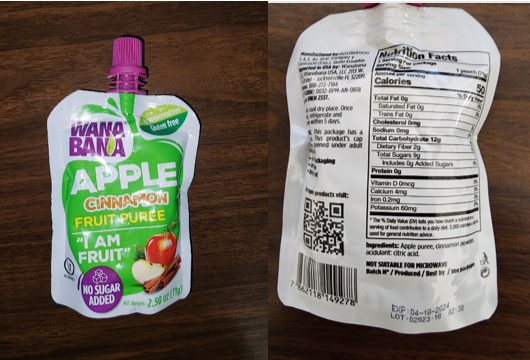Catawba County News

Team aids in toxic lead discovery
Published: November 02, 2023
CATAWBA COUNTY TEAM INSTRUMENTAL IN IDENTIFYING TOXIC FOOD
HICKORY – Catawba County Public Health’s Environmental Health team has been recognized by state public health leaders after the team’s investigation led to the identification of the source of lead exposure in children with lead poisoning.
Catawba County’s Environmental Health lead investigation team conducted site visits and interviewed parents to identify the possible source of lead exposure in the affected children.
“We take elevated blood lead levels in children very seriously and conduct a thorough investigation to ensure that the source of lead is removed so children can continue to grow and develop normally,” said Catawba County Environmental Health Administrator Megen McBride.
As part of the investigation, extremely high concentrations of lead were found in WanaBana apple cinnamon fruit puree that children were eating. A recall of the product was issued over the weekend. The recall includes WanaBana apple cinnamon fruit puree pouches, all lot codes and expiration dates. They were sold nationally through multiple retailers, including Sam’s Club, Amazon and Dollar Tree. The U.S. Food and Drug Administration, in its advisory to parents, said parents and caregivers of toddlers and young children who may have consumed WanaBana apple cinnamon fruit puree pouches should contact their child’s healthcare provider about getting a blood lead test. (The advisory can be found at https://www.fda.gov/food/alerts-advisories-safety-information/fda-advises-parents-and-caregivers-not-buy-or-feed-wanabana-apple-cinnamon-fruit-puree-pouches.)
“Catawba County’s lead investigation team was instrumental in identifying this product. Our team contributed to getting this product off of the market, thus protecting the health of children. This is a true example of how Public Health makes a difference and protects the health of the community,” said Catawba County Public Health Director Jennifer McCracken. “This is just one example of how Public Health’s behind-the-scenes work can make a big difference in the lives of our residents.”
The advisory was issued after a joint investigation by the North Carolina Department of Health and Human Services, local health departments, the North Carolina Department of Agriculture & Consumer Services and the FDA. Lead investigation teams from Catawba, Cleveland and Madison counties all participated in the investigation.
“This is an unfortunate situation but a great example of coordinated public health action at the local, state, and federal level to protect kids. Thanks for your work in this area and for the many other ways you all work behind the scenes to protect the health of your communities,” said Susan Kansagra, Director of the NC Division of Public Health, in an email to local public health directors.
Generally, elevated blood lead levels happen in children who have ingested lead. Common sources include chips of old lead-based paint; water contaminated by pipes or fixtures that contain lead; and contamination of certain children’s toys, jewelry, cosmetics or home remedies. Even a small amount of lead can cause damage to the brain and nervous system, and can result in slowed growth and development, learning and behavior problems, and hearing and speech problems in children, according to the U.S. Centers for Disease Control and Prevention. In North Carolina, all blood lead levels in children under age 6 are required to be reported to the North Carolina Department of Health and Human Services. Young children are undergoing critical neurological and physical development, which makes them especially vulnerable to the adverse effects of lead exposure.
NCDHHS recommends the following for consumers:
- If you have WanaBana brand apple cinnamon puree products in your home, do not eat them or feed them to your children. Dispose of the products immediately.
- Discuss blood lead testing with your medical provider if you are concerned about your child. NCDHHS recommends all children be tested for lead during their well-child visit at age 1 and again at age 2, when hand-to-mouth behavior is highest.
- Choose foods or spices with detailed product labels that allow the products to be traced in the event of a recall or other evidence of contamination.